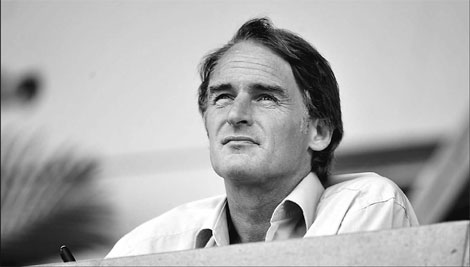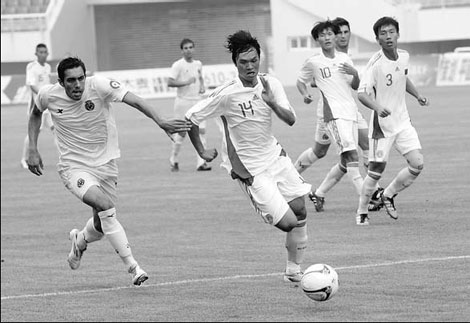Dutchman's vision
Updated: 2011-12-16 07:38
By Tang Zhe (China Daily)
|
|||||||||||
|
Jan Olde Riekerink said he thinks China needs to grow its soccer population. "I think one of the goals is to raise the number of players, starting in schools, and also helping coaches so more children will play soccer," he said. "And from an increased number of children playing, and proper soccer education, you will get the best national team." Provided to China Daily |
Youth coach says the game in China needs to improve on a number of levels, Tang Zhe reports
To rejuvenate Chinese soccer, Chinese Football Association (CFA) started to invite coaches from soccer powerhouses this summer as part of its salvage campaign. After Spaniard Jose Antonio Camacho took charge of the country's senior team in August, Dutchman Jan Olde Riekerink was named head of the Under-17 national teams three days later.
Compared with Camacho, who got a rude awakening in China through a painful early World Cup qualifying exit, Riekerink has had more time to get immersed in the nation's culture over the past few months - from its food, to its history and its people.
The 48-year-old, who worked at Jong Ajax, the reserve team of Dutch club AFC Ajax, as head of youth development before coming to China, said from what he had seen so far, Chinese players rely too much on the coach's instructions and need to think more for themselves.
"I can see they are used to people telling them what to do," Riekerink told China Daily. "We need to let them think a little bit more. Not as much as a Dutchman, but to improve their thinking about the game, their performance and their responsibility. That's is a key part of educating players.
"I think in life you have to make your own decisions. If you go with your car to a traffic light and it's red you have to stop, green you have to go, but when it's orange you have to make your own decision," said the Dutchman, who signed a five-year contract with the CFA. "We have to help them to understand what they are doing, and not doing, because I tell them what to do."
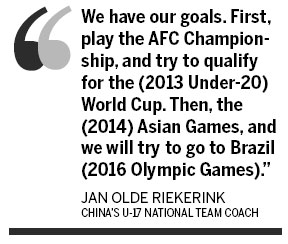
Meanwhile, the coach also pointed out young Chinese players were quite good at expressing themselves individually, but unwilling to show off their ideas in front of a crowd.
"I have talked with every player individually, 'Where are you from? Where do you live? What kind of sport do you like besides soccer? How often do you call your parents? Where do you play on the pitch and what are your qualities, and what do you think needs to improve?'" Riekerink said. "When I had individual talks with the players it was fantastic, they expressed themselves, but not in the group environment."
China has failed to qualify for the past three FIFA Under-20 World Cups over the past six years. Its Under-23 team appeared at the Beijing Olympic Games in 2008 as host nation (the first time since 1988), and was knocked out at the group stage.
Riekerink and his team is expected to end those embarrassing runs. The coach, whose squad has successfully booked a berth at next year's AFC Under-19 Championship, was more than clear about the team's mission and target.
"We have our goals. First, play the AFC Championship, and try to qualify for the (2013 Under-20) World Cup. Then, the (2014) Asian Games, and we will try to go to Brazil (2016 Olympic Games)," Riekerink said.
The Dutchman, whose team lost to Australia 3-0 in its last match at the AFC Championship qualifying (tournament) in November, said the biggest problem was getting the team to act as a unit due to a shortage of playing time together.
"The Australian team had been playing together for three years, but our side came together at the beginning of the year," Riekerink said. "So I think developing is always long term, it's not about investing in players today, and after three weeks, you have a totally different team. Next year we will play one year together, then they must improve.
"Our players have individual talent, they have technical skills, and I am sometimes impressed, but they have to be better at playing together as a team," he said. "(They also need to improve their) physical qualities, gain experience to play against top teams, more endurance and power."
Riekerink also pointed out his reason for coming to China.
"I saw players on the national team with all those attributes, I also trained some youth teams when I was in China earlier this year, they are really technical players, and I also can see where they can improve," said Riekerink, who has two main tasks during his tenure here: youth development and coaching the Under-19 team.
"I already have done some courses and let some coaches come to the training camp, talk to them and explain what we do. We will have a lot of training camps to reach one of our main goals ... I will help where I can," he said.
|
China's youth soccer is in need of greater depth, says coach Jan Olde Riekerink. Provided to China Daily |
(China Daily 12/16/2011 page23)
- Families to get $78,388 for school bus crash
- Gunmen opens fire at Chinese consulate in LA
- Toll fraud case retried; lesser sentence passed
- VP calls for a boost to domestic consumption
- New character took control in 2011
- Industries top cause of pollution
- China vows to make South China Sea safe
- Vehicle idling penalty comes into force in HK
Hot Topics
HIV/AIDS, Egypt protest, Thanksgiving, climate change, global economic recovery, home prices, high-speed railways, school bus safety, Libya situation, Weekly photos
Editor's Picks

|

|

|
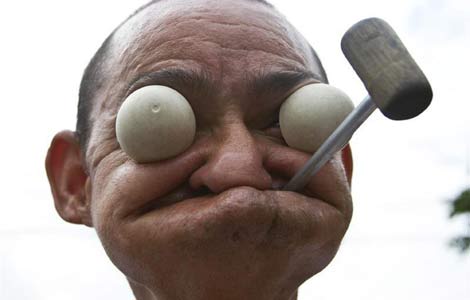
|
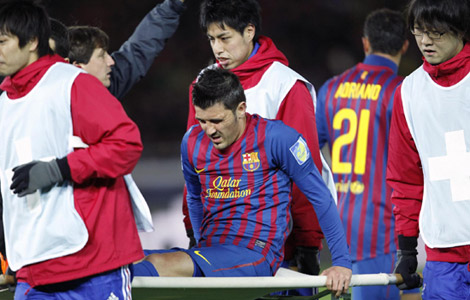
|
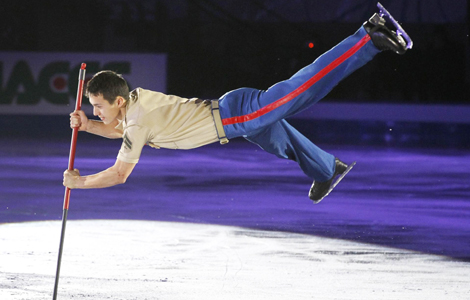
|
